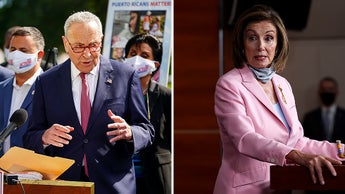
Speaker Nancy Pelosi (D-Calif.), Senate Majority Leader Charles Schumer (D-N.Y.) and Senate Minority Leader Mitch McConnell (R-Ky.) are playing a risky game of chicken over funding the government and raising the nation’s borrowing limit.
Pelosi and Schumer upped the stakes Monday by announcing they will force Republicans to vote next week on a short-term government funding measure that includes legislation to raise the nation’s debt ceiling.
The legislation will also include about $20 billion to respond to recent disasters, ranging from hurricane damage in the Gulf states to millions of acres scorched by wildfires in the West.
Republicans insist they will not vote on any package that includes a debt ceiling hike, something they say Democrats should have to do on their own despite decades of members of both parties voting to increase the borrowing limit to pay for past spending authorized by Democrats and Republicans alike.
In pairing the two measures, Democrats hope the GOP will take the public’s blame for shutting down the government if Republicans block the measure in the upper chamber.
The standoff could result in a government shutdown at the end of next week and provoke a crisis of confidence over the nation’s credit rating, something that last happened when Democrats and Republicans deadlocked over the debt limit in 2011.
McConnell made it clear last week that Republicans would vote against any proposal to lift the debt cap, even if paired with legislation to keep federal departments and agencies funded beyond Sept. 30. He then doubled down on that position on Monday.
“Senate Republicans would support a clean continuing resolution that included appropriate disaster relief and targeted Afghan assistance. We will not support legislation that raises the debt limit,” McConnell said from the Senate floor.
But Democrats do not want to kowtow to McConnell, who has pressed them to include a debt ceiling hike in a separate $3.5 trillion budget reconciliation package the party is preparing. That bill can’t be filibustered, meaning Democrats can get it to President Biden’s desk if they can stay unified.
Pelosi and Schumer argue the debt ceiling hike should be backed by members of both parties since it covers spending backed by Democrats and Republicans alike.
“The American people expect our Republican colleagues to live up to their responsibilities and make good on the debts they proudly helped incur in the December 2020 ‘908’ COVID package that helped American families and small businesses reeling from the COVID crisis,” the Democratic leaders wrote in their joint statement announcing their strategy.
McConnell’s strategy is focused on the $3.5 trillion reconciliation package that is unanimously opposed by Republicans. He wants Democrats to take the political hit for raising the debt ceiling as he and other Republicans criticize the majority party for their big spending measure.
Financial markets are beginning to take notice of the game of chicken. The Dow Jones Industrial Average plunged more than 900 points Monday before bouncing slightly before the close.
Monday’s stock dip was mostly blamed on fears over China’s property market but the brewing political storm around U.S. debt was also cited as a factor.
Democratic and Republican leaders in Congress are publicly predicting the other side will get the blame for any end-of-September blowup over government funding and the nation’s creditworthiness.
But both sides face political repercussions if there’s a political train wreck next week.
“Should Republicans careen our country toward a default, our country could actually be plunged into recession, laying off millions, making it harder for people to pay for the food on the table and their mortgages and their rents,” Schumer said on the Senate floor.
Democrats face another problem in using the budget reconciliation package to raise the debt ceiling. The budget resolution passed by both chambers last month didn’t include a reconciliation instruction for raising the debt limit. As a result, Senate Democrats would have to have another lengthy floor debate and vote-a-rama to amend the budget resolution to allow the debt limit to be increased with only Democratic votes.
“That’s not going to happen,” a Democratic senator on the Budget Committee predicted after his caucus held a meeting on debt-limit strategy.
Some Democrats feel confident that McConnell and his Senate GOP colleagues will get blamed for a government shutdown and any economic turmoil surrounding a defeat of debt limit legislation, but they acknowledge Biden might also take a hit.
Asked if a shutdown and subsequent market turbulence could hurt Biden politically, Senate Majority Whip Dick Durbin (D-Ill.) said “it could.” But Durbin said Republicans would clearly be the real culprits.
“The fingerprints are obvious. McConnell is boasting that he has the power to do this, so it isn’t a question of whether Biden didn’t do the right thing. It’s up to Congress. It’s our responsibility,” Durbin said.
Some Democrats worry that the last thing Biden needs right now is a debt crisis. His political standing, especially among independents, has fallen significantly since the end of July.
The slide in Biden’s support is being attributed to the messy exit of U.S. troops from Afghanistan and the surge of COVID-19 infections around the country, which has in turn dampened enthusiasm about the economy.
A Senate Democratic aide said “it’s very hard to imagine a world in which it doesn’t splash back on Biden” if the government shuts down or credit agencies downgrade the nation’s credit status because of a political battle over the debt limit.
Republicans are also worried about a meltdown over government funding and the debt limit.
Sen. John Cornyn (R-Texas), a member of McConnell’s leadership team, predicted that cooler heads would prevail next week, pointing out that nobody wants a shutdown that would shake the economy while its struggling in the face of a winter surge of COVID-19 infections and hospitalizations.
“I don’t think it’s going to happen,” he said, when asked about a possible government shutdown. “Nobody wants it.”
Via The Hill
